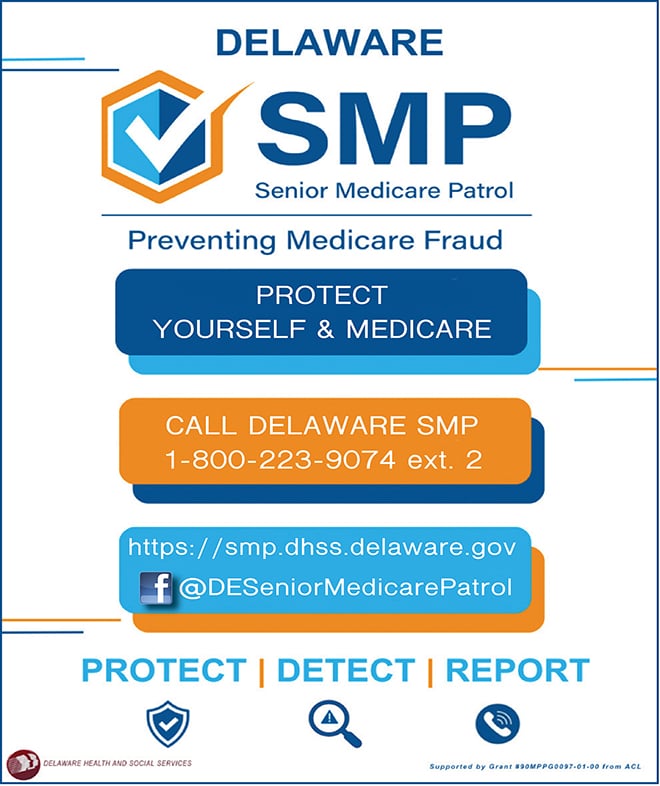Why Medicare Fraud Matters To Everyone
 By Lena Thayer
By Lena Thayer
It’s hard to care about an issue that you may not believe affects you; but there is an issue impacting us all every day, we just don’t notice it. Medicare fraud is costing taxpayers billions every year, threatening the healthcare of our seniors, their financial security, and jeopardizing the future of the program for aging Americans. $60 billion, that’s a really big number, and that is the estimate for how much is stolen from Medicare across the U.S. on an annual basis. It’s estimated that Delaware accounts for about 5% of that number; so roughly $3 billion. Imagine what could be accomplished in Delaware with $3 billion not being wasted on Medicare errors, abuse, and fraud? It’s thought that Medicare fraud is a victimless crime, but that belief is wrong. Medicare fraud impacts everyone. This article will discuss how Medicare impacts Americans in varying ways and how you can help prevent Medicare fraud from happening.
Direct impact
Delaware is one of the top ten states in the US in terms of percentage of elderly residents: with more than 22% of the state’s population, higher than the national percentage of 19%. This high percentage of elderly residents makes Delaware particularly vulnerable to the effects of Medicare fraud. When fraudsters siphon off Medicare funds, the immediate consequence is a depletion of resources available for genuine beneficiaries. This means that our seniors might face delays in receiving essential medical services, experience a decline in the quality of care, and endure increased out-of-pocket costs.
Economic impact
Medicare fraud doesn’t just hurt seniors; it affects everyone who pays taxes. The $3 billion lost to fraud in Delaware could have been used to improve healthcare infrastructure, fund public health initiatives, or even reduce the tax burden. Instead, this money is lining the pockets of criminals. This massive loss of funds leads to higher healthcare costs and insurance premiums for everyone. It’s a drain on the economy that stifles growth and diverts resources from essential services.
Community impact
Beyond the financial implications, Medicare fraud undermines the trust in our healthcare system. Seniors who fall victim to fraud often face significant emotional and psychological stress. They may become wary of seeking medical help or mistrustful of legitimate healthcare providers. This erosion of trust can have severe consequences, as it may lead to underreporting of medical issues or hesitance in participating in necessary medical procedures. Additionally, the burden of dealing with fraud-related issues often falls on family members, further straining family dynamics and resources.
Legal and ethical concerns
Medicare fraud is not just a financial crime; it is a moral and ethical violation. Those who commit Medicare fraud are taking advantage of a system designed to protect our most vulnerable populations. They are not just stealing money; they are stealing health and security. The legal system must continuously adapt to address new and sophisticated forms of fraud, but it also needs the public’s help to identify and report suspicious activities.
How you can help
Preventing Medicare fraud requires vigilance and proactive engagement from everyone. Here are some steps you can take to help combat this issue:
- Stay informed: Educate yourself about the different types of Medicare fraud, such as billing for services not provided, performing unnecessary tests, or falsifying a diagnosis.
- Monitor statements: Regularly check Medicare Summary Notices (MSNs) and Explanation of Benefits (EOBs) for any suspicious charges or services you do not recognize.
- Report suspicious activity: If you notice any discrepancies or suspect fraud, report it immediately to the Medicare hotline at 1-800-MEDICARE or the Delaware Senior Medicare Patrol.
- Protect personal information: Never share your Medicare number or personal information with anyone who contacts you unsolicited. Scammers often pose as representatives from Medicare or healthcare providers.
- Educate others: Spread awareness about Medicare fraud among friends, family, and community members. The more people are aware, the harder it becomes for fraudsters to succeed.
Conclusion
Medicare fraud is a pervasive issue that affects us all, directly, and indirectly. By understanding its impact and taking steps to prevent it, we can help protect our seniors, safeguard our financial resources, and ensure the longevity and integrity of the Medicare program. Every effort counts in the fight against Medicare fraud, and together, we can make a significant difference. Let’s stand up for our seniors, our community, and our future by staying vigilant and proactive in the battle against Medicare fraud.
302-255-9774
Follow on facebook @DESeniorMedicarePatrol
and instagram @deldhss


